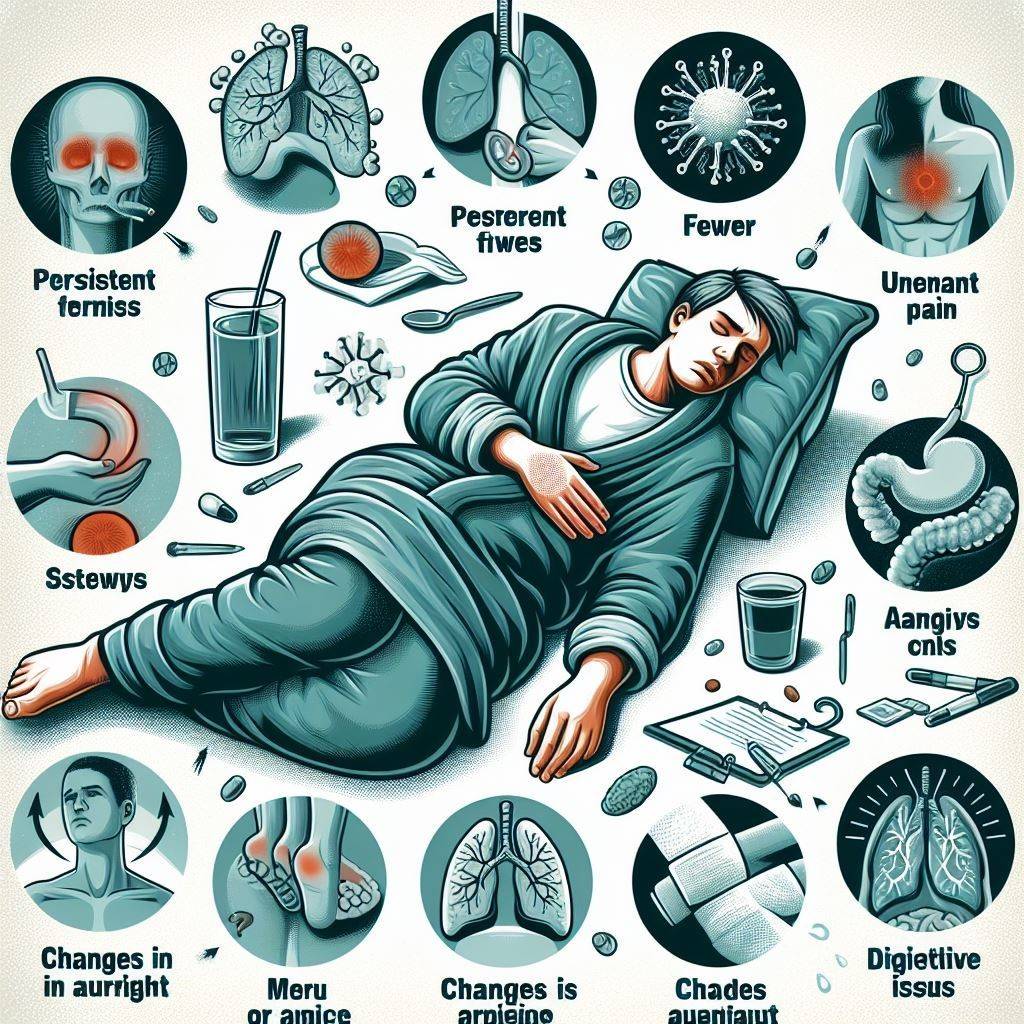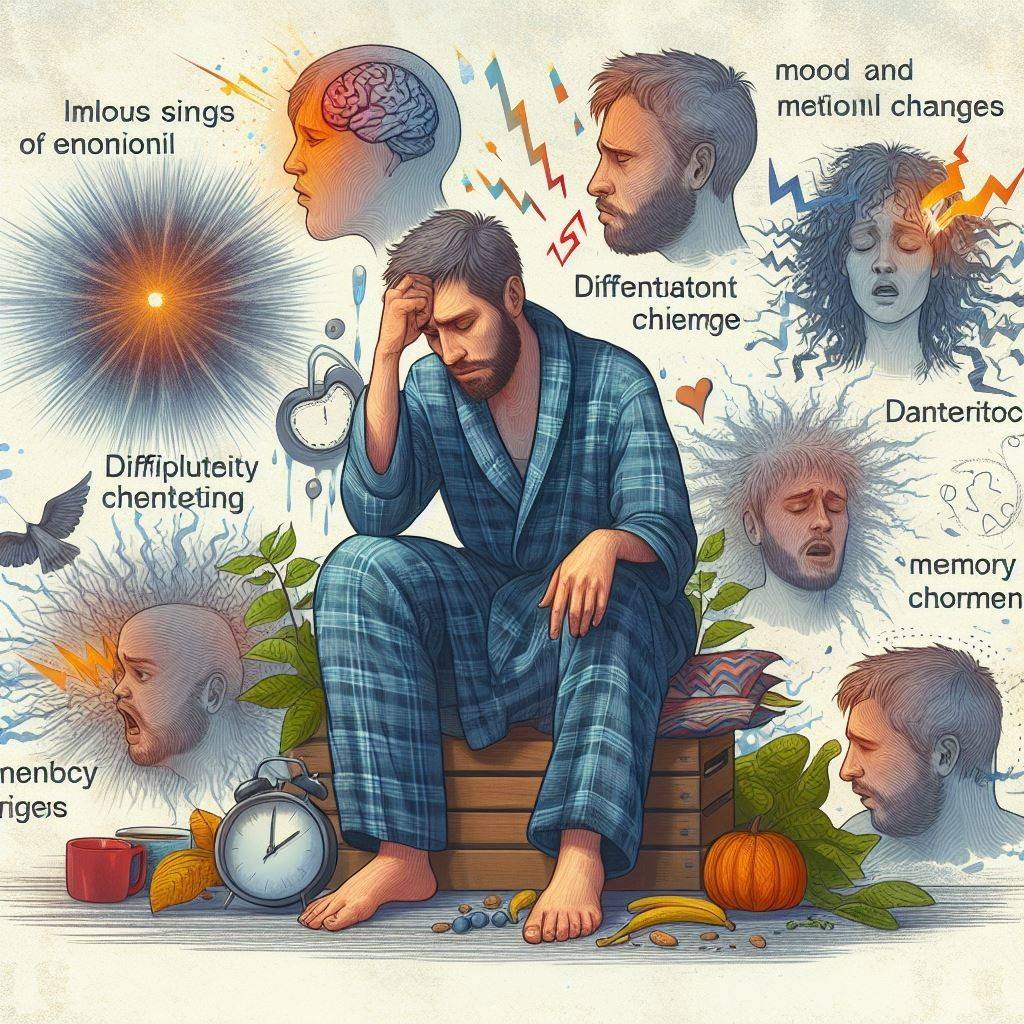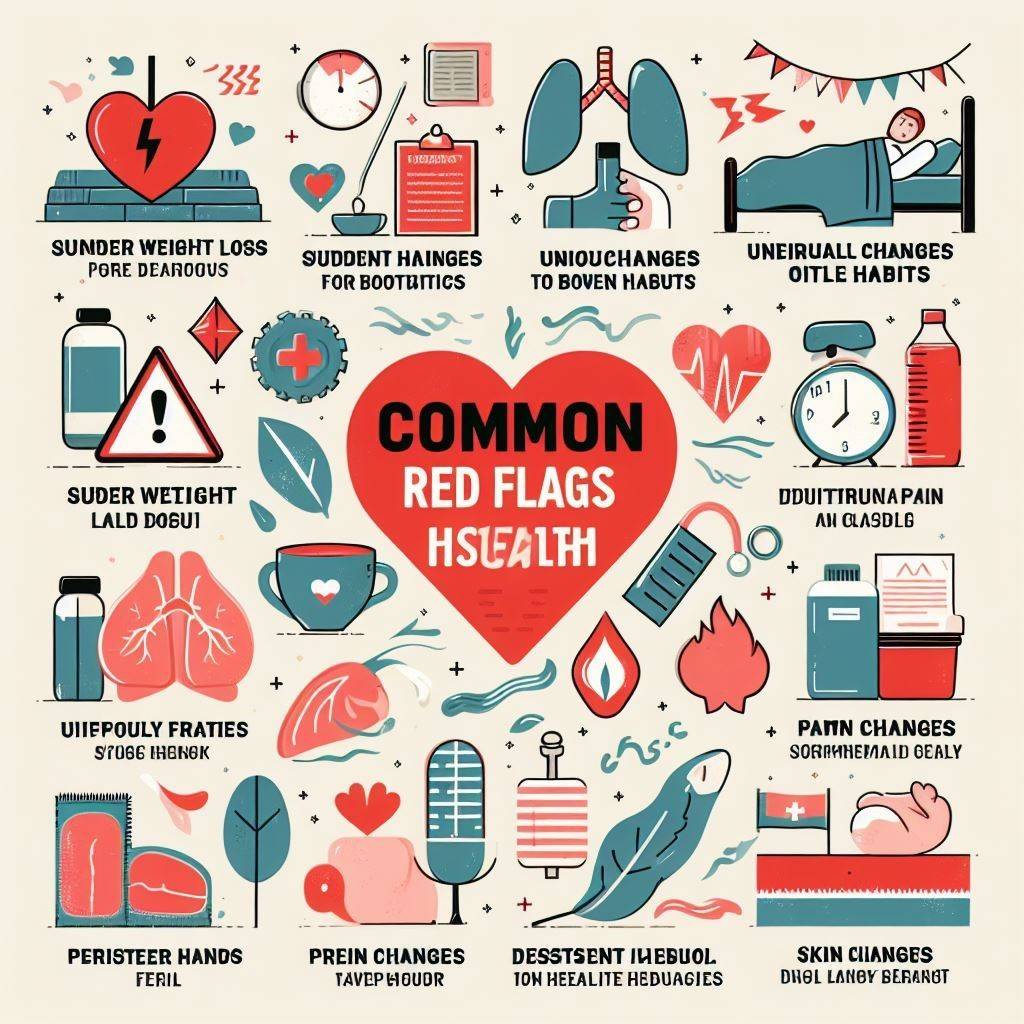How do I Know If I’m Unwell: Red Flags for Health
Feeling under the weather? Learn to recognize the red flags signalling illness. From fatigue to fever, this guide explores how do I know if I’m unwell and when to seek medical help.
Introduction
In our fast-paced lives, it’s easy to ignore subtle changes in our bodies and brush off feelings of being “under the weather.” However, recognizing the early signs of illness is crucial for maintaining good health. How do I know if I’m unwell? This question can be challenging to answer, as symptoms can be vague or easily attributed to other factors like stress or fatigue.
This comprehensive guide will explore the various red flags that may indicate an underlying health issue, empowering you to take charge of your well-being proactively. By understanding the signals your body sends and learning to decipher them, you can seek prompt medical attention when needed and address any concerns before they escalate.
Part 1: Physical Signs of Illness

Persistent Fatigue
While feeling tired after a long day or during periods of increased activity is normal, persistent fatigue that doesn’t improve with rest can be a sign of an underlying health condition. How do I know if I’m unwell due to fatigue? Pay attention to whether you’re struggling to get through routine tasks or feeling exhausted even after a good night’s sleep.
Fatigue can be a symptom of various conditions, including:
- Anemia
- Thyroid disorders
- Chronic fatigue syndrome
- Autoimmune diseases
- Infections
- Sleep disorders.
If you’ve been experiencing prolonged fatigue, it’s essential to consult a healthcare professional to rule out any serious underlying causes.
Fever and Chills
A fever is one of the body’s natural responses to fighting off infections or illnesses. How do I know if I’m unwell due to a fever? A temperature above 100.4°F (38°C) is generally considered a fever, and it may be accompanied by chills, sweating, or shivering.
While a mild fever is often harmless and a sign that your immune system is working, a high or persistent fever can indicate a more severe condition. Seek medical attention if you have a fever that:
- Lasts more than a few days.
- Is accompanied by a severe headache, stiff neck, or rash.
- Causes dehydration or difficulty breathing.
Unexplained Pain
Pain is the body’s way of signalling that something is wrong. How do I know if I’m unwell based on pain? Pay attention to any persistent or recurrent pain, whether it’s a headache, muscle ache, joint pain, or abdominal discomfort.
Unexplained pain can be a symptom of various conditions, including:
- Injuries or inflammation
- Autoimmune disorders
- Infections
- Digestive issues
- Neurological conditions
If you experience pain that interferes with your daily activities or doesn’t respond to over-the-counter medications, it’s essential to seek medical evaluation.
Changes in Appetite or Weight
Significant changes in appetite or weight can be indicators of an underlying health condition. How do I know if I’m unwell based on appetite or weight changes? Pay attention to whether you’ve experienced a sudden and unexplained increase or decrease in your appetite or have noticed significant weight fluctuations.
These changes can be associated with various conditions, including:
- Thyroid disorders
- Diabetes
- Depression or anxiety
- Gastrointestinal issues
- Certain cancers
If you’re concerned about changes in your appetite or weight, it’s essential to discuss them with your healthcare provider.
Digestive Issues
Digestive problems, such as constipation, diarrhea, bloating, or abdominal pain, can be signs of an underlying health issue. How do I know if I’m unwell due to digestive issues? Pay attention to any persistent or recurring problems with your digestive system.
Digestive issues can be caused by various factors, including:
- Food intolerances or allergies
- Irritable bowel syndrome (IBS)
- Inflammatory bowel disease (IBD)
- Gastrointestinal infections
- Certain cancers
If you’re experiencing persistent digestive issues, it’s important to consult a healthcare professional for proper evaluation and management.
Part 2: Emotional and Mental Signs of Illness

Mood Swings and Emotional Changes
While it’s normal to experience fluctuations in mood, persistent or severe mood swings or emotional changes can be signs of an underlying health condition. How do I know if I’m unwell based on mood or emotional changes? Pay attention to whether you’re experiencing sudden shifts in mood, increased irritability, or feelings of sadness or anxiety that interfere with your daily life.
Mood and emotional changes can be associated with various conditions, including:
- Depression or anxiety disorders
- Hormonal imbalances
- Thyroid disorders
- Neurological conditions
- Certain medications
If you’re concerned about mood or emotional changes, it’s important to seek professional help from a mental health professional or your healthcare provider.
Difficulty Concentrating or Memory Problems
While occasional forgetfulness or difficulty concentrating can be normal, persistent, or severe cognitive issues may indicate an underlying health condition. How do I know if I’m unwell based on cognitive changes? Pay attention to whether you’re having trouble focusing, remembering things, or completing tasks that were previously easy for you.
Cognitive issues can be associated with various conditions, including:
- Stress or anxiety.
- Sleep disorders.
- Neurological conditions (e.g., dementia, Alzheimer’s disease)
- Thyroid disorders
- Vitamin deficiencies
If you’re experiencing persistent cognitive difficulties, it’s important to discuss them with your healthcare provider for proper evaluation and management.
Lack of Motivation or Energy
While everyone experiences periods of low motivation or energy, persistent feelings of lethargy or apathy can be signs of an underlying health condition. How do I know if I’m unwell based on a lack of motivation or energy? Pay attention to whether you’re struggling to find the motivation to complete daily tasks or engage in activities you once enjoyed.
Lack of motivation or energy can be associated with various conditions, including:
- Depression or anxiety disorders
- Chronic fatigue syndrome
- Thyroid disorders
- Sleep disorders.
- Certain medications
If you’re experiencing a persistent lack of motivation or energy, it’s important to discuss it with your healthcare provider for proper evaluation and management.
Contributing Factors to Feeling Unwell

While the signs and symptoms discussed above can be indicators of an underlying health condition, it’s important to note that various lifestyle factors can also contribute to feeling unwell. Here are some common factors to consider:
Chronic stress can take a toll on both physical and mental health. Prolonged stress can lead to various issues, including:
- Headaches
- Digestive problems
- Insomnia
- Weakened immune system.
- Mood disorders (e.g., anxiety, depression)
Practicing stress management techniques, such as exercise, meditation, or seeking professional help, can help mitigate the negative effects of stress on overall well-being.
Lack of Sleep
Adequate sleep is essential for overall health and well-being. Chronic sleep deprivation or poor sleep quality can contribute to various issues, including:
- Fatigue
- Difficulty concentrating
- Weakened immune system.
- Mood disorders
- Increased risk of chronic diseases (e.g., obesity, diabetes, cardiovascular disease)
Establishing a consistent sleep routine, creating a sleep-conducive environment, and addressing any underlying sleep disorders can help improve sleep quality and overall health.
Poor Diet and Nutrition
A balanced and nutrient-rich diet is crucial for maintaining good health. Poor dietary habits or nutritional deficiencies can contribute to various issues, including:
- Fatigue
- Weakened immune system.
- Digestive problems
- Nutrient deficiencies
- Increased risk of chronic diseases (e.g., obesity, diabetes, cardiovascular disease)
Incorporating a variety of whole foods, such as fruits, vegetables, lean proteins, and whole grains, into your diet can help provide the necessary nutrients for optimal health.
Lack of Physical Activity
Regular physical activity is essential for maintaining overall health and well-being. A sedentary lifestyle can contribute to various issues, including:
- Weight gain or obesity
- Muscle weakness and loss of flexibility
- Increased risk of chronic diseases (e.g., heart disease, diabetes, certain cancers)
- Mood disorders (e.g., depression, anxiety)
- Poor sleep quality
Incorporating regular exercise, such as brisk walking, swimming, or strength training, into your routine can help combat the negative effects of a sedentary lifestyle and promote overall well-being.
Chronic Health Conditions
Existing chronic health conditions, such as diabetes, heart disease, or autoimmune disorders, can also contribute to feeling unwell. Proper management and treatment of these conditions are crucial for maintaining overall health and preventing complications.
When to Seek Medical Attention
While some mild or temporary symptoms may resolve on their own, it’s important to seek medical attention if you experience any of the following:
- Persistent or severe symptoms that interfere with your daily life.
- Symptoms that worsen over time or don’t improve with self-care measures.
- Sudden or severe pain, fever, or other concerning symptoms
- Unexplained weight loss or changes in appetite
- Persistent fatigue or cognitive issues
- Changes in bowel or bladder habits
- Unusual bleeding or discharge
If you’re unsure whether your symptoms warrant medical attention, it’s always better to err on the side of caution and consult with a healthcare professional.
Preventive Care and Regular Check-ups
In addition to addressing specific symptoms or concerns, regular preventive care and check-ups can help identify potential health issues early, before they become more severe. This includes:
- Annual physical examinations
- Age-appropriate cancer screenings (e.g., mammograms, colonoscopies)
- Routine blood work and lab tests
- Immunizations and vaccinations
- Dental and vision check-ups
By maintaining a proactive approach to your health and working closely with your healthcare providers, you can better monitor your well-being and address any concerns promptly.
FAQs about How do I Know If I’m Unwell
How do you know if you’re unwell?
When you’re unwell, your body often sends signals that something isn’t quite right. Pay attention to persistent or recurring symptoms like fatigue, fever, pain, changes in appetite or weight, digestive issues, mood swings, and difficulty concentrating. These can be red flags that your health is out of balance. If you’ve been feeling “off” for a while and it’s interfering with your daily life, it’s best to consult a healthcare professional to get to the root of the issue.
How do you know if you have an illness?
While occasional aches and pains are normal, if you’re experiencing multiple symptoms simultaneously or they’re lasting longer than usual, it could indicate an underlying illness. Common signs of illness include fever, chills, body aches, headaches, fatigue, nausea, vomiting, diarrhea, or a persistent cough or sore throat. Trust your instincts – if you just don’t feel like yourself, it’s worth getting checked out by a doctor.
How do you tell you are not feeling well?
Various signs can signal you’re not feeling well. It could be physical symptoms like exhaustion, muscle aches, digestive issues, or a general feeling of being run down. Or you might notice changes in your mental state, such as difficulty concentrating, mood swings, or lack of motivation. Pay attention to any persistent or recurring symptoms that are out of the ordinary for you – these could be your body’s way of saying something is off.
How do you know if you’re truly sick?
While mild symptoms like a slight cough or runny nose could just be a passing bug, some telltale signs indicate a more serious illness. Seek medical attention if you experience high fever, severe body aches, persistent vomiting or diarrhea, difficulty breathing, or sudden, unexplained pain or swelling. Likewise, if symptoms persist for more than a few days or you just feel utterly drained and miserable, it’s a good idea to get checked out by a doctor to rule out anything more serious.
Conclusion
Recognizing the signs and symptoms of illness is crucial for maintaining good health. By being attuned to your body’s signals and seeking medical attention when needed, you can address any underlying health issues promptly and prevent them from worsening.
Remember, how do I know if I’m unwell? It’s essential to pay attention to persistent or severe symptoms, listen to your body, and consult with healthcare professionals when you have concerns. Additionally, adopting a healthy lifestyle, including a balanced diet, regular exercise, stress management, and adequate sleep, can contribute to overall well-being and potentially prevent or mitigate various health issues.
By taking a proactive approach to your health and working closely with your healthcare team, you can better navigate any health concerns and prioritize your well-being.



